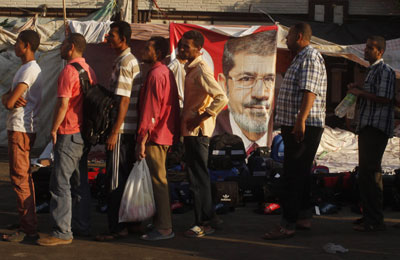
Egypt economy chiefs vow to ease shortages
Cairo, July 18, 2013
Economic ministers in Egypt's new military-backed government are pledging to ease shortages and make it easier for factories to operate, while signalling that any major reforms to repair the state's crumbling finances will be undertaken cautiously.
The cabinet, formed this week, has not yet issued a detailed statement on its plans for the economy, but public comments by ministers suggest they will focus first on reducing public discontent and removing barriers to industrial production.
Major structural reforms of economic policy, such as changes to Egypt's wasteful and expensive system of fuel and food subsidies, will be discussed, but early action is unlikely.
"My first priority is to make sure that supplies of basic commodities like wheat are within the safe limits," Thursday's state-owned Al-Ahram newspaper quoted Mohamed Abu Shadi, a police general who was appointed supply minister, as saying.
Foreign exchange shortages under the government of president Mohamed Mursi, ousted this month by the army, reduced Egypt's wheat imports and its stocks of the grain have fallen.
Shadi said he aimed for a public discussion about Egypt's bread subsidies, a debate that would include producers, distributors and consumers. But he did not specify when the talks would end and when decisions on any reforms might be made.
State news agency MENA quoted him as saying no action affecting citizens would be taken before a public opinion poll had been conducted to find out their needs and demands.
INTERIM
The caution with which Egypt's interim cabinet is approaching economic policy stems from the political pressures it will face in a tense transition back to civilian rule.
After a year of Mursi's administration, Egypt's fiscal position is desperate; in recent months government revenue has covered barely half of all expenditure, leaving borrowing and aid to make up the rest.
But a major task of the interim government is to steer Egypt to parliamentary elections expected in about six months. The transition could be delayed by any radical reforms of the budget system that hurt living standards and brought protesters back onto the streets.
Also, this month's pledges of $12 billion of economic aid from Saudi Arabia, the United Arab Emirates and Kuwait are likely to ease immediate pressure on the budget, allowing the government to continue spending in coming months.
So rather than pushing bold policy changes in the near term, the new cabinet looks likely to focus on trying to resolve some of the logjams, logistical breakdowns and inefficiencies that damaged the economy under Mursi, such as the fuel shortages that caused public outrage.
Sherif Ismail, the new oil minister, told Al-Ahram this week that he would focus on meeting domestic demand for petroleum products by increasing natural gas production and resuming imports of diesel and low-quality mazut fuel.
Interim trade and industry minister Mounir Fakhry Abdel Nour said his priority would be resuming halted industrial projects, providing power to industry, and bolstering security in industrial areas.
In an apparent effort to secure working class support for the government, manpower minister Kamal Abu-Eita, a former union leader, has said he plans to strengthen legal protection for unions and improve minimum wage policy. He did not give details.
STALLED IMF TALKS
The cabinet as a whole has not yet said clearly whether it will resume talks with the International Monetary Fund on a $4.8 billion loan, which would come attached to economic reform commitments that the government might find politically risky.
Planning minister Ashraf al-Arabi said this week that now was not the right time to restart negotiations with the IMF because the aid from the Gulf would carry Egypt through the transitional period.
The new finance minister, Ahmed Galal, said in a statement late on Wednesday that an IMF loan was "part of the solution", but he did not specify whether the interim government would aim to sign an IMF deal during its tenure, or leave that to a post-election administration.
It is possible that the interim government, which is packed with economic technocrats, will hold talks with the IMF and make minor reforms, laying the groundwork for bigger changes.
Final decisions and implementation of them, as well as the signing of any IMF deal, could be left to the next government, which will be able to claim a democratic mandate.
"We need time to read and study the issues and files on the ground, to come up with sound and well thought-out decisions that will pave the way and build the future for governments to come," Galal said in his statement.
He said it was important to manage public spending and bring the budget deficit under control. But he also said Egypt needed to avoid deflationary policies as they could hurt the labour market - a hint that quick, sharp public spending cuts would not be made.
An army official, speaking on condition of anonymity as he was not authorised to talk publicly about economic issues, said the army understood the importance of fixing the economy and would give the cabinet a lot of leeway to do so.
"We are leaving it to the interim government to decide on polices, and they will get our backing on whatever they agree to do, including if they want to move forward with the IMF deal." – Reuters







